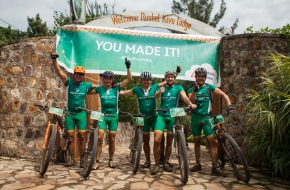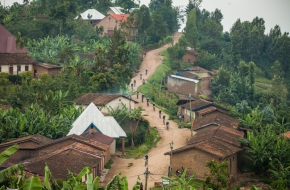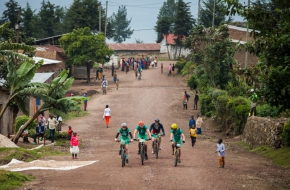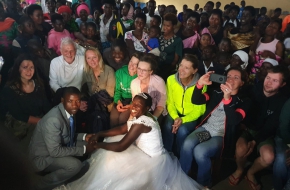Bike for Africa 2020 is...
- a biking event, a fantastic physical challenge, and the best team building ever!
- another great way to bring Brussels Airlines, Eurowings and Lufthansa Group colleagues from all departments together
- a social project to support sustainable development in the region, with a strong link to our Design Thinking project
- a unique discovery of the real Africa, far away from the beaten tracks
- a self-sustaining project at zero company cost
Humanitarian & sustainable development support
All bikers raised funds to financially suppport the “Rwanda Charity Eye Hospital” founded by the Belgian ophthalmologist Piet Noé. One of the issues of Rwanda is the scarceness of ophthalmologists, only 14 per 12 million inhabitants. Piet, who invested all his savings in the hospital and asked friends & relatives to help with the fundraising, opened the hospital in 2018 with the aim to provide eye care to all Rwandans who need it.
On the last day of their stay in Rwanda, the bikers visited the hospital and hand over a check to Piet Noë.



- Kokka (small company in the area of Gakenke) that wants to enhance quality of animal feeds for better nourished animals, and hence the quality of meat and milk for human consumption
- Kinunu Agroprocessing, a coffee company that processes raw coffee to roasted and fine packaged coffee for home consumption ; they create all-in production chain locally & prepare for export.
Finally, we will also support the "Berwa Kinunu" project. This is a project set up by our hostess, Mme Odette Nyiramilimo , of the Rushel Lodge in Kinunu, former Minister of Social Affairs in the Rwanda Government, and Senator. The project wants to help reintegrate very young single mothers in society by training them in a handicraft, hence providing them with an income. The girls now tailor school uniforms for children. We will provide them with yarn and cloth.
Info Rwanda
The Republic of Rwanda is a country in Central / East Africa and one of the smallest countries on the African mainland. Located a few degrees south of the Equator, Rwanda is bordered by Uganda, Tanzania, Burundi, and RDC.
It is situated in the African Great Lakes region, with numerous lakes throughout the country. The climate is temperate to subtropical, with two rainy seasons and two dry seasons each year. We will be there in the short dry season with occasional rains and reasonable temperatures. Rwanda is at an average height of 1.500m, which makes it cool at night and pleasantly warm during the day.
Rwanda has a presidential system of government, with Paul Kagame as president who took office in 2000. Rwanda is one of only two countries with a female majority in the national parliament. Social tensions between Hutu and Tutsi population erupted in the 1994 genocide, in which Hutu extremists killed an estimated 500,000 to 1 million Tutsi. A visit of the Genocide Memorial is programmed.
Rwanda's economy suffered heavily in wake of the 1994 genocide, but has since strengthened. The economy is based mostly on agriculture. Coffee and tea are the major cash crops for export. Tourism is a fast-growing sector and is now the country's leading foreign exchange earner. Rwanda is one of only two countries in which mountain gorillas can be visited safely.
Explore the Programme
- 29/1: flight SN465 Brussels – Kigali, overnight stay in Mille Collines hotel
- 30/1: Bustrip KGL to Ruhondo (about 2,5 hours). Afternoon to adapt to heights and enjoy scenery. Short warming up biking trip. Briefing of both bikers and non-bikers. Overnight stay at the Foyer de CharitéTravel to Cyangugu (departure point) and/or intermediate points for non-biker project teams
- 31/1: First biking day between Ruhaonda and Kinini (about 45 kms). Arrival and first overnight at the African Rising Cycling center. Visit of centre and learn about the Tour of Rwanda success story.
- 1/2: Second cycling day will be a choice of 2 to 3 loops in the Volcany area, prepared for us by the African Rising Cycling Center (approx. 30 – 40 – 60 kms). Second overnight stay at the Centre.
- 2/2: Third and longest cycling trip between Kinini and Gisenyi at the Kivu Lake (about 90 kms). The first part of the trip may be a paved road by then, but gives beautiful views of the Volcano area. The last 35 kms are descending, but on dirt road. This is by far the poorest area of the country, in contrast with the high end Gorilla tourism nearby. After a steep 1 km climb in Gisenyi, we will stay overnight at the Kivu Peace Hotel.
- 3/3: First part of the Congo Nile trail bringing us from Gisenyi to Kinunu. Quite difficult track with steep climbs, but beautiful views, and for about 48 kms. Overnight stay at the Rushel Lodge at Kivu Lake level. About half of the participants will have to overnight in tents (yippie!)
- 4/2: last cycling trip starting in Kinunu and arriving there as well . Total distance is about 70 kms for some 2.200 height metres. Back in the Rushel Lodge, we will have a “closing ” ceremony and party.
- 5/2: After breakfast: bus trip to Kigali (3,5 hours), visit to the Rwanda Charity Eye Hospital where we will hand over the check. The LHG Management for Europe, Middle-East and Africa will meet the group there and together they will talk about Bike of Africa and the strengthened cooperation bewteen Brussels Airlines and the LHG aid organisation helpalliance. Departure from KGL to BRU via EBB on SN465 (arriving in Brussels early on the 6th).




